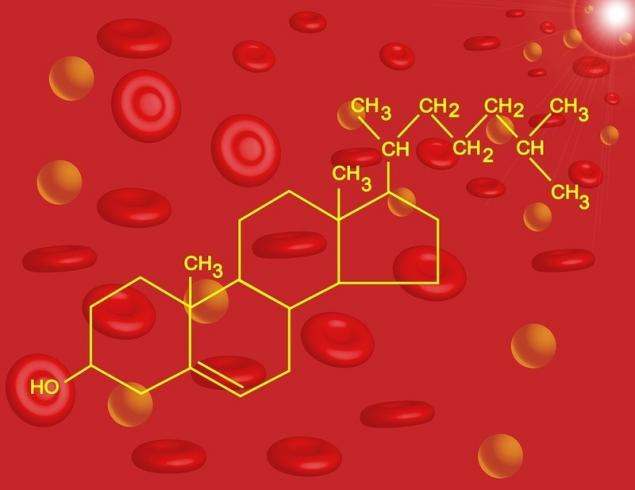556
People with high cholesterol live longer!
The benefits of high cholesterol
People with high cholesterol live longer. This statement seems so incredible that it takes a long time to realize its importance. However, this fact is evident from many research articles. In accordance with data published in 1994, Dr. Harlan Krumholz of the Department of cardiovascular medicine at Yale University, elderly people with low cholesterol died from heart attack two times more often than men of the same age with high cholesterol. Supporters of the "cholesterole campaign" constantly ignore his observation, or consider it as a rare exception among a huge number of studies which found the opposite results.
But this is no exception. Currently, there are already many data that contradict the lipid hypothesis.

Specifically, the majority of observations for the elderly have shown that high cholesterol is not a risk factor for coronary heart disease. This was the result of my study of the medical database covering the issue. This is the conclusion reached by the authors of 11 studies of the elderly; in a further 7 studies have established that high cholesterol is also a symptom of prediction in all cases, mortality.
Currently, it is considered that 90% of all cardiovascular disease occurs in people over 60 years in addition, almost all of the work indicate that high cholesterol is not a risk factor for women.
Thus, high cholesterol is a risk factor for less than 5% of those dying from myocardial infarction.
For people with high cholesterol have an even more comforting data: 6 studies it was found that there is inversely proportional relationship between the total mortality and levels of total or LDL ("bad", M. D.) cholesterol, or both. This means that those who want to live to be very old, much better to have high cholesterol than low.
High cholesterol protects against infection
Many studies show that having low cholesterol is in certain situations worse than high.
For instance, in 19 large studies dedicated to the analysis of a total of 68 000 deaths, a review of which was made by Professor David R. Jacobs and his team from the Department of Epidemiology, University of Minnesota, low cholesterol was recognized as predictive of high risk of death from gastrointestinal and respiratory diseases.
As you know, most of these diseases have infectious origin.
The group of Professor Jacobs, together with Dr. Carlos Iribarren, during the 15 years observed 10 000 healthy individuals in San Francisco. It was found that those who had low cholesterol at baseline, were more often admitted to hospitals because of infectious diseases. Is it not likely that at low levels of cholesterol people somehow more vulnerable to infection and that high cholesterol protects those who opposed infection? There is a lot of evidence that support this interpretation.
Cholesterol and chronic heart failure
There are many indications that bacteria or other microorganisms play an important role in the development of heart failure.
So for example, patients with severe chronic heart failure is high levels of blood endotoxin and various types of cytokines. Endotoxin is the most toxic compound formed by bacteria such as E. coli, Klebsiella, Salmonella, Serratia.
And now the conspicuous fact – to their surprise, the researchers found that mortality was more pronounced not only in patients with anergy (a weakening or complete lack of protective reactions of the immune system to allergens, which are bacteria and their toxins, M. D.) but also in patients with the lowest levels of lipid, total cholesterol, LDL - and HDL- ("good and bad", M. D.) cholesterol, and triglycerides.
Later this was confirmed by Dr. Rauchhaus, working in collaboration with researchers at several German and British University hospitals. They established a strict inverse relationship between risk of death and total blood and LDL-cholesterol as well as triglycerides: patients with high lipid levels lived significantly longer than those who had low levels. In another study conducted by Dr. Tamara Horwich, within 5 years, there has been a thousand patients with severe heart failure. By the end of this period died, 62% of patients with cholesterol below 129 mg/l, but only half of the cholesterol which was above 223 mg/l.
Laboratory and experimental studies
With our laboratory studies, in particular, a group of researchers from Germany and Denmark under the direction of Dr. Sucharit Bhakdi, it was found that a component of blood plasma, which can not only communicate, but also to neutralize dangerous bacterial toxins, LDL is a carrier of the so-called "bad" cholesterol. Other components of plasma, including HDL, do not have this property.
The starting point of research of Professor Matthew Muldoon and his team at the University of Pittsburgh was the assumption that LDL is not only inactivates bacterial toxins, but also has a direct beneficial effect on the immune system, which probably can explain the observed relationship between low cholesterol and various chronic diseases.
The researchers found that the content of total, and also various types of leukocytes in the blood of healthy young men and middle-age were significantly lower in individuals with low content of LDL-cholesterol than those who have this indicator was higher. On this basis, it was concluded that immune system of men with low and high content of cholesterol in the blood have certain differences. Now, 7 years after the publication of these data, it can be argued that the immune supporting properties of LDL — cholesterol does play an important role in human health.
The results of clinical observations and laboratory data highlighting the role of LDL-cholesterol was confirmed by experimental studies on animals (Professor Kenneth Feingold and his group, University of California; Dr. Mihai Netea, Netherlands, etc.).
Cholesterol as a risk factor
The results of most studies indicate that for men young and middle age high level of cholesterol is a risk factor for coronary heart disease, which at first glance is in contradiction with the idea of the protective role of high cholesterol. A possible explanation for this is that people at this age very often are in the midst of his professional career. Therefore, high cholesterol should be viewed as the result of mental stress which is a known cause of high cholesterol and a risk factor of coronary heart disease. Again: high cholesterol is not the direct cause but may only be a token (sign - M. E.) for Example, in the described cases of high cholesterol can show that the body requires it more as a building material for the synthesis of stress hormones. Therefore, the possible protective effect of high cholesterol may counter negative effect of stress on the vascular system.
The answers to damage
Scientists have proposed various potential causes of vascular injury: components of tobacco smoke, a high content of LDL-cholesterol, oxidized cholesterol, homocysteine, the metabolic products from diabetes, lack of vitamins A and D, TRANS fatty acids, microorganisms and many others (with one exception). There is evidence to support the role of all these factors (with one exception), but the extent of their participation in the damage of the vascular wall remains unclear. With the exception, of course, is LDL cholesterol, since the results of many studies allow us to remove it from this list. The researchers found no link between levels of blood lipids and severity of atherosclerosis.
Does high cholesterol from cardiovascular disease ?
I mentioned my main argument, but it deserves to repeat it again and again: high levels of cholesterol in the blood is associated with the longevity of the elderly. Hard to explain, if not to proceed from this conclusion, the fact that the lowest rate of mortality from cardiovascular diseases of the elderly characteristic of those who have observed a high level of cholesterol. Could it be possible that because of the high cholesterol has damaged the walls of the arteries and developed fatal coronary heart disease if people with high blood cholesterol live longer than people with low content...
All the people and the scientific community I say, "Wake up!"
Translations and summaries by M. Ehrman

Uffe Ravnskov, MD, PhD
Dr. Uffe Ravnskov, MD, PhD, is Chairman of The International Network of Cholesterol Skeptics (THINCS), an international organization composed of scientists, doctors, scientific workers from different countries. The members of the organization hold different views on the reasons for the development of atherosclerosis and cardiovascular diseases.
However, they have in common is that they do not recognize the role of animal fats and high levels of cholesterol in the development of these diseases.
Dr. Uffe Ravnskov, since 1990, has published some 40 studies and reports in the well-known Scandinavian and international medical journals, which were considered dubious connection between cholesterol and cardiovascular disease.
One of his most significant publications is the book "the Cholesterol Myth" ("Myth about cholesterol") — was first published in Sweden and then in Finland, Germany, USA.
This article appeared in 2004 in the spring issue of the quarterly magazine of the Weston A. Price Foundation
Article in full can be read on the website: The Benefits of High Cholesterol
Source: www.childneurologyinfo.com/health-text-diseases16.php
People with high cholesterol live longer. This statement seems so incredible that it takes a long time to realize its importance. However, this fact is evident from many research articles. In accordance with data published in 1994, Dr. Harlan Krumholz of the Department of cardiovascular medicine at Yale University, elderly people with low cholesterol died from heart attack two times more often than men of the same age with high cholesterol. Supporters of the "cholesterole campaign" constantly ignore his observation, or consider it as a rare exception among a huge number of studies which found the opposite results.
But this is no exception. Currently, there are already many data that contradict the lipid hypothesis.

Specifically, the majority of observations for the elderly have shown that high cholesterol is not a risk factor for coronary heart disease. This was the result of my study of the medical database covering the issue. This is the conclusion reached by the authors of 11 studies of the elderly; in a further 7 studies have established that high cholesterol is also a symptom of prediction in all cases, mortality.
Currently, it is considered that 90% of all cardiovascular disease occurs in people over 60 years in addition, almost all of the work indicate that high cholesterol is not a risk factor for women.
Thus, high cholesterol is a risk factor for less than 5% of those dying from myocardial infarction.
For people with high cholesterol have an even more comforting data: 6 studies it was found that there is inversely proportional relationship between the total mortality and levels of total or LDL ("bad", M. D.) cholesterol, or both. This means that those who want to live to be very old, much better to have high cholesterol than low.
High cholesterol protects against infection
Many studies show that having low cholesterol is in certain situations worse than high.
For instance, in 19 large studies dedicated to the analysis of a total of 68 000 deaths, a review of which was made by Professor David R. Jacobs and his team from the Department of Epidemiology, University of Minnesota, low cholesterol was recognized as predictive of high risk of death from gastrointestinal and respiratory diseases.
As you know, most of these diseases have infectious origin.
The group of Professor Jacobs, together with Dr. Carlos Iribarren, during the 15 years observed 10 000 healthy individuals in San Francisco. It was found that those who had low cholesterol at baseline, were more often admitted to hospitals because of infectious diseases. Is it not likely that at low levels of cholesterol people somehow more vulnerable to infection and that high cholesterol protects those who opposed infection? There is a lot of evidence that support this interpretation.
Cholesterol and chronic heart failure
There are many indications that bacteria or other microorganisms play an important role in the development of heart failure.
So for example, patients with severe chronic heart failure is high levels of blood endotoxin and various types of cytokines. Endotoxin is the most toxic compound formed by bacteria such as E. coli, Klebsiella, Salmonella, Serratia.
And now the conspicuous fact – to their surprise, the researchers found that mortality was more pronounced not only in patients with anergy (a weakening or complete lack of protective reactions of the immune system to allergens, which are bacteria and their toxins, M. D.) but also in patients with the lowest levels of lipid, total cholesterol, LDL - and HDL- ("good and bad", M. D.) cholesterol, and triglycerides.
Later this was confirmed by Dr. Rauchhaus, working in collaboration with researchers at several German and British University hospitals. They established a strict inverse relationship between risk of death and total blood and LDL-cholesterol as well as triglycerides: patients with high lipid levels lived significantly longer than those who had low levels. In another study conducted by Dr. Tamara Horwich, within 5 years, there has been a thousand patients with severe heart failure. By the end of this period died, 62% of patients with cholesterol below 129 mg/l, but only half of the cholesterol which was above 223 mg/l.
Laboratory and experimental studies
With our laboratory studies, in particular, a group of researchers from Germany and Denmark under the direction of Dr. Sucharit Bhakdi, it was found that a component of blood plasma, which can not only communicate, but also to neutralize dangerous bacterial toxins, LDL is a carrier of the so-called "bad" cholesterol. Other components of plasma, including HDL, do not have this property.
The starting point of research of Professor Matthew Muldoon and his team at the University of Pittsburgh was the assumption that LDL is not only inactivates bacterial toxins, but also has a direct beneficial effect on the immune system, which probably can explain the observed relationship between low cholesterol and various chronic diseases.
The researchers found that the content of total, and also various types of leukocytes in the blood of healthy young men and middle-age were significantly lower in individuals with low content of LDL-cholesterol than those who have this indicator was higher. On this basis, it was concluded that immune system of men with low and high content of cholesterol in the blood have certain differences. Now, 7 years after the publication of these data, it can be argued that the immune supporting properties of LDL — cholesterol does play an important role in human health.
The results of clinical observations and laboratory data highlighting the role of LDL-cholesterol was confirmed by experimental studies on animals (Professor Kenneth Feingold and his group, University of California; Dr. Mihai Netea, Netherlands, etc.).
Cholesterol as a risk factor
The results of most studies indicate that for men young and middle age high level of cholesterol is a risk factor for coronary heart disease, which at first glance is in contradiction with the idea of the protective role of high cholesterol. A possible explanation for this is that people at this age very often are in the midst of his professional career. Therefore, high cholesterol should be viewed as the result of mental stress which is a known cause of high cholesterol and a risk factor of coronary heart disease. Again: high cholesterol is not the direct cause but may only be a token (sign - M. E.) for Example, in the described cases of high cholesterol can show that the body requires it more as a building material for the synthesis of stress hormones. Therefore, the possible protective effect of high cholesterol may counter negative effect of stress on the vascular system.
The answers to damage
Scientists have proposed various potential causes of vascular injury: components of tobacco smoke, a high content of LDL-cholesterol, oxidized cholesterol, homocysteine, the metabolic products from diabetes, lack of vitamins A and D, TRANS fatty acids, microorganisms and many others (with one exception). There is evidence to support the role of all these factors (with one exception), but the extent of their participation in the damage of the vascular wall remains unclear. With the exception, of course, is LDL cholesterol, since the results of many studies allow us to remove it from this list. The researchers found no link between levels of blood lipids and severity of atherosclerosis.
Does high cholesterol from cardiovascular disease ?
I mentioned my main argument, but it deserves to repeat it again and again: high levels of cholesterol in the blood is associated with the longevity of the elderly. Hard to explain, if not to proceed from this conclusion, the fact that the lowest rate of mortality from cardiovascular diseases of the elderly characteristic of those who have observed a high level of cholesterol. Could it be possible that because of the high cholesterol has damaged the walls of the arteries and developed fatal coronary heart disease if people with high blood cholesterol live longer than people with low content...
All the people and the scientific community I say, "Wake up!"
Translations and summaries by M. Ehrman

Uffe Ravnskov, MD, PhD
Dr. Uffe Ravnskov, MD, PhD, is Chairman of The International Network of Cholesterol Skeptics (THINCS), an international organization composed of scientists, doctors, scientific workers from different countries. The members of the organization hold different views on the reasons for the development of atherosclerosis and cardiovascular diseases.
However, they have in common is that they do not recognize the role of animal fats and high levels of cholesterol in the development of these diseases.
Dr. Uffe Ravnskov, since 1990, has published some 40 studies and reports in the well-known Scandinavian and international medical journals, which were considered dubious connection between cholesterol and cardiovascular disease.
One of his most significant publications is the book "the Cholesterol Myth" ("Myth about cholesterol") — was first published in Sweden and then in Finland, Germany, USA.
This article appeared in 2004 in the spring issue of the quarterly magazine of the Weston A. Price Foundation
Article in full can be read on the website: The Benefits of High Cholesterol
Source: www.childneurologyinfo.com/health-text-diseases16.php
The construction of the well, the signs by which you can find water
Success depends on how much time you are NOT working






















